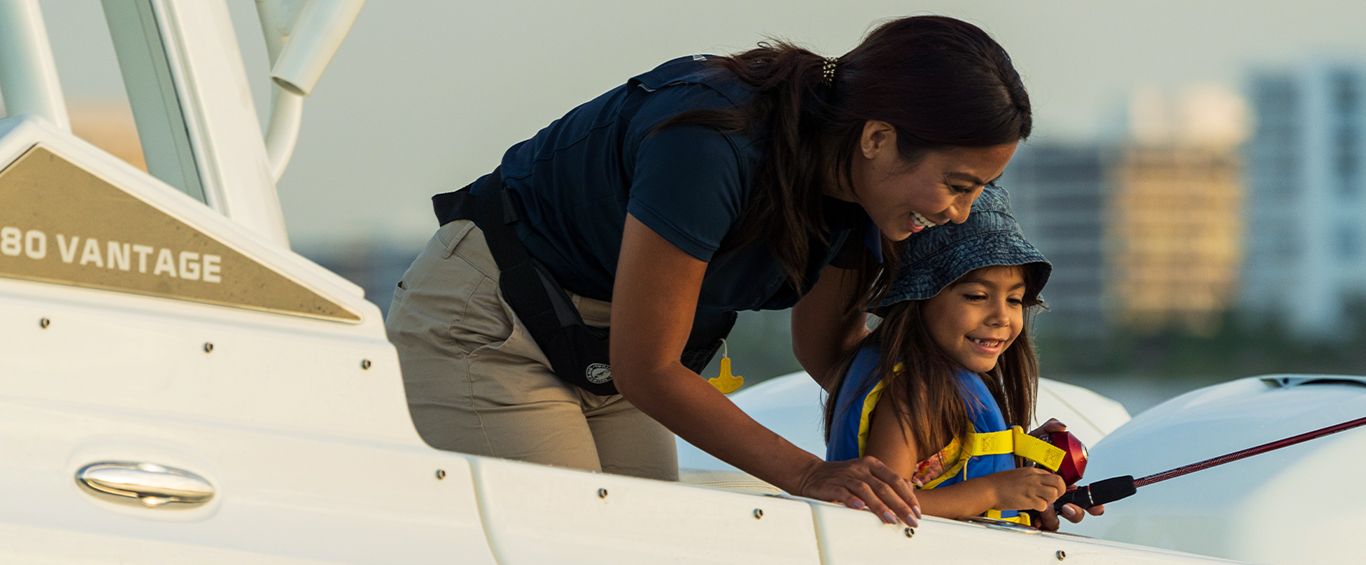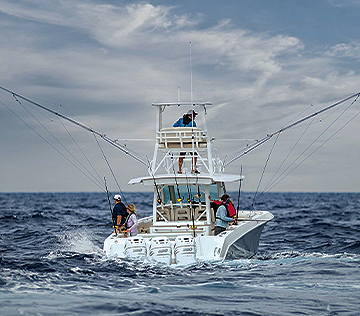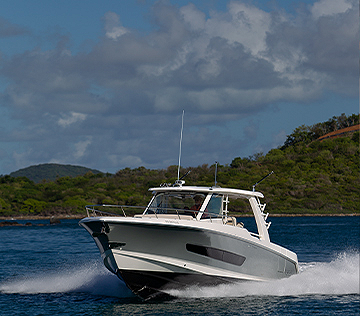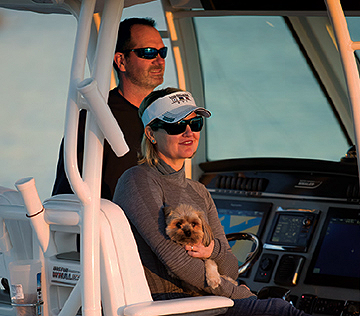
Boat Safety Basics
Before you hit the water, brush up on your boat safety knowledge with our helpful compilation of tips, rules and regulations. Plus, handy packing checklists based on your intended boating terrain.
As the captain of your Whaler, you’re responsible for keeping your family and friends safe on the water, and that means knowing and obeying safety guidelines. While we’ve compiled a list of the most basic safety rules and regulations, state laws and local rules can vary, so you’ll want to do a bit of your own research, as well.
Remember how learning the rules of the road seemed overwhelming at first? Boating might feel the same. But as you explore your local waterways, the rules of boating will feel more and more natural, letting you and your passengers enjoy a safe, memorable day on the water.
Before You Go
Prepare your Boston Whaler and passengers before your adventure begins to minimize the risk of injury.
Know Your Boat
Read and follow the instructions and warnings in your Boston Whaler owners manual.
Wear Your PFD
Your personal flotation device (PFD), a.k.a. your life jacket, could keep a small mistake from turning deadly. There must be a properly sized PFD for every person onboard, and children under 13 must wear theirs at all times.
Follow the Weight Limit
Find the decal in your boat that indicates the boat’s weight limit, and make sure your guests and their cargo don’t exceed the limit.
Know the Rules
State laws and local rules can vary. Do your research to make sure you know the requirements.
Check Your Equipment
Inspect your boat, PFDs and other safety equipment before you head out.
Mind Your Seating
Make sure passengers sit in locations where they’re not at risk of falling overboard or blocking the captain’s view.
At the Fueling Station
Safety against fire begins well before your boating adventure. You can never be too cautious when handling fuel, so make sure to follow these steps when proceeding to the pump:
· Close all vents, doors and hatches.
· Move any portable tanks outside the boat.
· Ground the nozzle to the tank opening.
· Extinguish any flames onboard (e.g. from lit cigarettes, cigars, pipes or cooktops).
While on Your Boston Whaler
Because boats don’t have brakes, avoiding collisions takes more effort and foresight than it would in a car. Keep an eye on the conditions, water and other boaters to anticipate any dangers that can come your way and work to avoid them ahead of time.
Boat Sober
Drinking and boating is just as illegal and dangerous as drinking and driving. Make sure there’s a driver on board who will stay sober.
Watch the Weather
Conditions can turn quickly. Check the weather often, keep an eye on the sky, and know the safest — and quickest — way off the water.
Keep Your Eyes Open
Keep an eye out for swimmers, water-skiers and other hazards. Be sure to look where other boats are headed and give them plenty of room.
Follow Wake Restrictions
Slow down in no-wake zones and observe no-wake hours.
Be Prepared
Wear your lanyard cut-off switch so the engine will shut off if you’re thrown from the helm.
Board Safely
Approach someone in the water on the driver’s side so you know where they are. Idling isn’t enough to prevent propeller strikes or carbon monoxide poisoning. Shut off the engine when picking up swimmers or skiers, and have them use a boarding ladder.
Participating in Watersports
When you’re towing a water-skier, tuber or wakeboarder, they’re off the boat and more exposed to hazards. You’re responsible for their fun and their safety.
Protect Your Rider or Skier
Always have an observer onboard to watch and communicate with the rider or skier using the universal hand signals.
Use Your Flags
Each state has different laws regarding flags that indicate a boat is towing someone. Follow your state’s laws and watch carefully for flags on other boats.
Consider Your Surroundings
Don’t participate in watersports near shore, swimming areas, shallow water, unknown waters, anglers or divers.
Be Mindful of Your Tow Lines
Make sure your tow lines don’t injure passengers or get tangled in the propeller.
Continue Your Education
All of these safety tips come down to one thing: vigilance. Always know your surroundings, know where your passengers and riders are, and know local hazards, laws and rules. And remember that keeping your passengers safe — and having fun — on your Boston Whaler boat is your responsibility.
Many organizations host boating safety courses. Find local licensing resources at boaterexam.com or discover in-person, on-water training courses available near you via BoatClass.
Safety Gear Checklists for Your Whaler
Stock your boat with the necessities and stow any other items you think could come in handy. Use the following checklists to make sure you have everything you need to keep your crew safe or to help in the case of an emergency.
Items Required by Regulation
The U.S. Coast Guard requires certain items on your boat at all times.
❏ PFDs
❏ Fire extinguishers
❏ Visual distress signals
❏ Sound signals
❏ Ventilation on boats using gasoline
❏ Backfire flame control on boats using gasoline
Recommended Items
Outfitting your Whaler with the right items will help you and your crew stay safe. Your needs may change depending on where you boat.
For everyone:
❏ First-aid kit
❏ Watersports flag
❏ Anchor
❏ Sunscreen
❏ Extra water and food
❏ Boarding ladder
❏ Carbon monoxide detector
❏ A set of oars or a paddle
For boaters on nearshore waters:
❏ GPS
❏ Compass
❏ Depth finder
❏ Tool kit and safety knife
❏ VHF radio
For boaters on offshore waters:
❏ Everything above
❏ Searchlight and strobe light
❏ Radar and radar reflector
❏ Sea drogue
❏ Emergency Position Indicating Radio Beacon (EPIRB)
❏ Man-overboard recovery gear
❏ Automatic identification system (AIS)
❏ Radio direction finder
❏ Long-range communication gear
❏ Weather information system
❏ An emergency position-indicating radio beacon station (EPIRB) or emergency locator beacon (ELB)
--
This is for general information purposes only. Your use or reliance on any of the information in this Blog is solely at your own risk. Under no circumstance will we have any liability for any loss or damage of any kind incurred as a result of the use of any of the information provided.
Options and features mentioned subject to change. Please confirm availability of all accessories and equipment with an authorized Boston Whaler Dealer.



